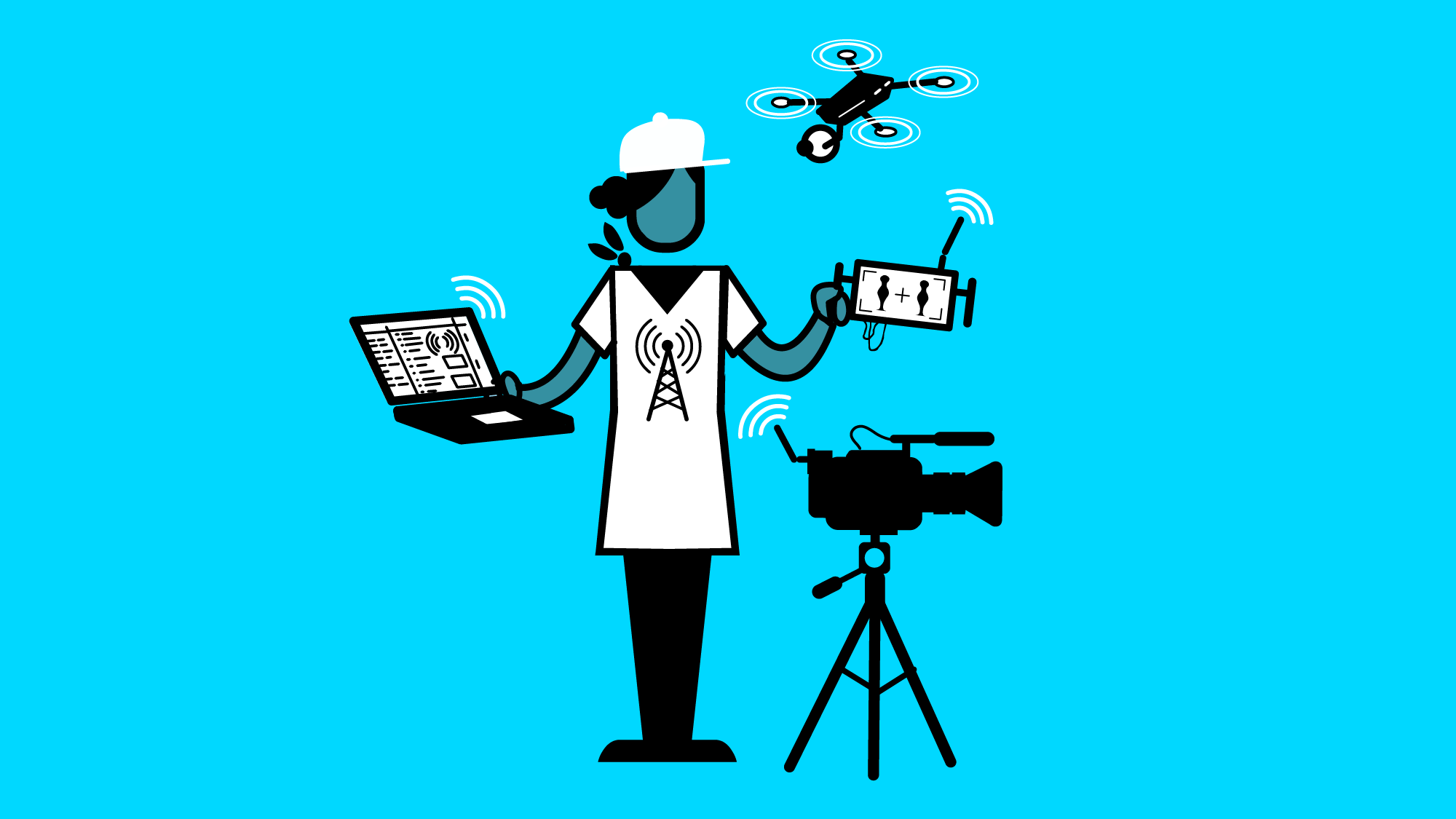Broadcast engineering
RF engineer
Also known as: Transmitter engineer

What does an RF engineer do?
Radio signals play a very important role in broadcasting, as they carry the pictures and sound to your home. Radio frequency (RF) engineers often work at a transmitter station, which are usually on high ground so they can reach as large an area as possible. For example, the transmitter at Crystal Palace – one of the tallest structures in London – serves most of the capital. Transmitter engineers usually work with a team in a fixed location, but sometimes travel to look after and fix problems with smaller transmitters.
Some RF engineers have a very different job, working in the studio or on location helping to produce programmes. They often use radio equipment to receive pictures from mobile cameras – this is particularly important in environments where cables would be dangerous. For example, the camera operators running up and down the touchline at a football game can move much more quickly if there are no cables getting in the way. Likewise, a radio camera operator on the dance floor of Strictly Come Dancing can get right up to the dancers without any risk of cables tripping them up.
Drones might also be used at a football game to film a panoramic view from high above the stadium. They use radio waves both to control the drone in the air and to pick up the pictures and sound.
RF engineers working in a production environment understand the pressures of a live transmission and how important it is that technology doesn’t let a broadcast down. They often work on location, sometimes for long hours to meet strict deadlines.
This is a very specialised role, so RF and transmitter engineers often expand their career into areas outside the broadcast sector such as telecoms, aviation and the military. Whatever their area of work, they need a clear understanding of how radio frequencies operate, particularly to avoid getting interference. You get interference when frequencies are too close and clash, picking up some of the signal from another broadcaster – like when your car radio starts getting interruptions from other stations as you drive into a different region. Many essential services such as the ambulance and fire services and the military use radio waves, so it’s important not to clash with them.
For a big event like a royal wedding, it is very important that each broadcaster gets a licence to hire certain frequencies so they don’t end up clashing with the signals from other broadcasters.
Watch and read
What is an RF engineer good at?
- Radio technology: Having high-level knowledge of radio equipment and electronics used for transmitting signals
- Working under pressure: keeping calm in difficult conditions and meeting tight deadlines
- Technical knowledge: having a good understanding of how the equipment needed to broadcast a programme works
Who does an RF engineer work with?
Alongside colleagues who work with signals such as satcomms engineers and location engineers, as well as control room engineers in charge of distributing the programme.
How do I become an RF engineer?
Most RF and transmitter engineers have an engineering degree, although it may be possible to get into this career without going to university and instead working for several years in a similar role. RF and transmitter engineers need to know about the sort of technologies that are common in broadcasting and need a good understanding of computer networking.
If you’re a technical person – the one who’s always asked to fix mobile phones and laptops in your house – this is a great career path. Working as an RF or transmitter engineer is well paid and opens many other professional doors, in broadcasting as well as other industries.
At school or college
If you’re interested in a career in broadcast engineering, A-levels in maths, physics and computer science would be good to get under your belt. You could combine these with subjects from the arts and humanities, such as English, history or music, which may come in useful for the content of the programmes you work with. Languages are also handy if you need to travel or want to work with foreign broadcasters – studying A-level Spanish might be your ticket to working at the 2026 World Cup in Mexico!
The following Level 3 vocational qualifications are also relevant to this role:
- BTEC in Engineering with Engineering Maths
- Cambridge Technical Extended Certificate in Engineering
- BTEC National Foundation Diploma in Engineering
- C&G Technical Certificate in Engineering
- EAL Technical Diploma/Extended Diploma in Engineering Technologies
- BTEC Diploma/Extended Diploma in Electrical and Electronic Engineering
- City & Guilds Advanced Technical Diploma in Electrical Installation
- EAL Diploma/Advanced Diploma in Electrical Installation
Selected schools and colleges have also started offering T-levels – a qualification equivalent to three A-levels that is designed to help you get into the industry of your choice. Study is 80% classroom- and 20% work placement-based.
The following T-levels would help to kick-start your career in broadcast engineering:
- Digital Production, Design and Development
- Digital Support Services
- Digital Business Services
- Design and Development for Engineering and Manufacturing
- Maintenance, Installation and Repair for Engineering and Manufacturing
- Engineering, Manufacturing, Processing and Control
Apprenticeships
Apprenticeships are jobs with training. Search for apprenticeships in broadcast engineering with broadcasters like BBC and Sky. Go to What’s an apprenticeship? to find out more and Where can I find an apprenticeship? to find apprenticeships in your region. Alternatively, you can approach companies directly. Take a look at our list of apprenticeships to find the schemes of the main broadcasters. The BBC has a three-year broadcast and media systems degree apprenticeship that offers a mix of practical experience and university study in all areas of media systems engineering. You may also be interested in the level 3 apprenticeship for broadcast and media systems technical operator
Volunteer
Get involved with events in your local community, whether that’s running the sound for your school talent show, managing the special effects for an amateur dramatics society or helping out at a volunteer-run radio station.
Contact theatre productions or local music venues that can get you behind the scenes of a production environment. Anything that gives you experience in dealing with equipment in a live environment will be helpful. Voluntary experience is great for your CV, because it shows you’re enthusiastic, have technical ability and experience and you work well as part of a team.
Build a portfolio
Get a degree
A degree in a maths or science subject would stand you in good stead for entering the world of broadcast engineering. You could also look at electronic engineering or computing. Go to ScreenSkills Select to find university and college courses accredited by ScreenSkills.
Look outside the industry
If you can’t or don’t want to get into broadcast engineering straightaway, industries that require similar skills include telecoms, live events and radio. These would enable you to strengthen your technical abilities and get experience with technical equipment.
Get work experience
Write to local production companies and ask if they offer technical assistant roles. Keep an eye out for work experience opportunities at the BBC, ITV, Channel 4, Sky and the PACT Indie Diversity Training Scheme.
Alternatively, try approaching a rental equipment company that supplies productions with the gear they need. This will enable you to get your hands on equipment, learn more about it and get to know people who work in TV.
Take a short course
If you are over 18, make a ScreenSkills account and check out ScreenSkills’ Training and opportunities page and click on Training to see what courses are available, whether they are in person or online. The training doesn’t have to be linked directly to broadcast engineering; for example, a short course on developing resilience would help you understand how to thrive in challenging circumstances.
Network
Get to know people in the film and TV industry by attending events such as ScreenSkills’ Open Doors. Go to Training and opportunities and use the events filter to find out what’s on. Meet professionals and ask them questions about their work, while demonstrating interest in and knowledge of the industry. Offer to provide them with your professional contact details and try to stay in touch with them. Go to Network well to learn how to do this.
Network online
Create a LinkedIn profile. See if there are Facebook pages or other social media groups for people making film and TV in your area. Create a ScreenSkills profile. There are a lot of crewing agencies that will charge you to be on their books. Sign up to the free ones initially. Wales Screen, Northern Ireland Screen and Filming in England offer free crew databases and opportunities to network in person. Find a film office near you and get connected. If you do sign up to paid sites, make sure they specialise in the areas in which you’re interested.
Search for jobs
Search for jobs on the broadcasters’ websites as well as on LinkedIn and other job-hunting websites. Make use of the ScreenSkills jobs board. You can also send a short speculative letter with your CV to technical managers or vision supervisors.
You might also be interested in...
Satcomms engineer, MCR engineer, OB engineer and location engineer.
Further resources
- BritishFilm Commission list of UK studios
- Engineering Council
- Rise: Women in Broadcast
- The Institution of Engineering and Technology
- The International Trade Association for the Broadcast & Media Industry
- Society of Media Professionals, Technologists and Engineers
- International Broadcasting Convention
- The Media Production & Technology Show
- E&T (Engineering & Technology) magazine
- NEP UK and Ireland
- Broadcast – Tech Talks
- Broadcast Buddy TV YouTube channel
- BBC Research and Development
- BBC Academy
- ITV Entry Careers
- Sky early careers
- 4Skills (Channel 4)
- Bectu (the media and entertainment union)
- Bectu Ratecards







